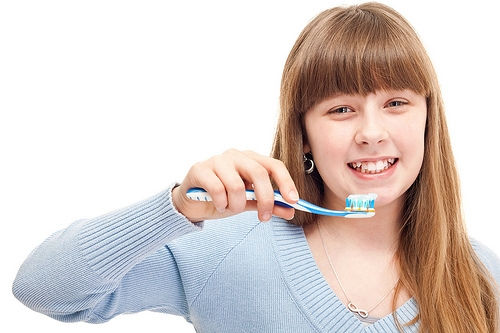Double Duty
September 10th, 2025

If you play a contact sport, you know about mouthguards. You know about the cushioning protection they provide for your teeth. And not just your teeth—mouthguards also help protect your lips, tongue, and jaw, helping you avoid or minimize many of the injuries caused by collisions.
But you don’t have to be part of the defensive line or face off on center ice to wear a mouthguard. It pays to be proactive with your oral health in any activity where impact is a possibility. Whether you play a team sport, practice gymnastics, ride a bike, ski, skateboard, or participate in other athletic pastimes, there’s almost always the risk of impact—with a ball, with the mat, with the sidewalk, with another person.
So, how do mouthguards protect your teeth and mouth? It’s a combination of materials and design. Mouthguards are made of a strong, cushioning material such as plastic or silicone, which helps absorb and distribute the force of impact, usually in the form of a horseshoe-shaped piece that fits over your upper teeth. The specific design can be tailored to the sport or activity you’ll be using it for.
And now that you’re wearing braces? Working toward an attractive, healthy smile doesn’t mean you can’t be active or find a mouthguard that will work for you. In fact, when you wear braces, mouthguards do double duty—they protect your mouth and teeth, and they protect your braces, too!
Even minor impacts can damage wires and brackets, and damaged braces means more time at the orthodontist and lost treatment time. More important, your guard not only helps protect your brackets and wires from impact injury, it protects your delicate mouth tissue from trauma caused by impact with your brackets and wires.
Because you probably have braces on both upper and lower teeth, the usual mouthguard design might not work for you. To make sure you’re completely protected, you may need a guard that covers both upper and lower arches.
There are over-the-counter mouth guards designed for braces, and even for covering both your upper and lower teeth. These might be one-size-fits-all or fit-it-yourself guards, or models which should be used only after a fitting at our West Bend, WI dental. While some of these guards are better than others, the best option for your teeth—and your braces—might be a custom mouthguard.
What are the benefits of a custom guard for orthodontic patients? They:
- Provide a perfect fit around teeth and braces
- Protect better because they fit better
- Are designed for easy breathing and speaking
- Are less bulky
- Are more durable
- Fit more comfortably
- Can accommodate orthodontic adjustments
- Can be tailored to your specific sport or activity.
Custom mouthguards are more expensive, because they are individually crafted for your teeth and braces, but in terms of effectiveness, they are the best guards out there—because they are individually crafted for your teeth and braces. If cost is an issue, Dr. Carl Meyers can let you know whether an over-the-counter option might work for you.
An active life should mean proactive dental care. Wearing a mouthguard when you’re wearing braces protects both your body and your orthodontics. Whichever guard option you choose, it’s a good idea to check out the fit with Dr. Carl Meyers to make sure you’re getting all the protection you need for both when your mouthguard is doing double duty.






